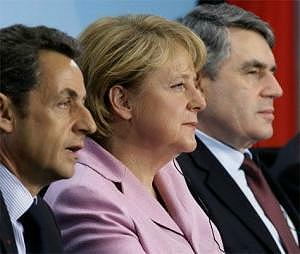European Leaders Urge G-20 Financing for Climate Protection
BRUSSELS, Belgium, September 21, 2009 (ENS) - The climate change crisis is not officially on the G-20 agenda at its upcoming meeting in Pittsburgh, but G-20 European leaders want to make sure global warming and the negotiations to write a new treaty limiting global warming in Copenhagen in December are not overlooked at the Pittsburgh meeting.
They say there are many financial issues linked to climate change that should be addressed by the G-20.
"The climate is changing much faster than expected. The risks posed by climate change are real and can already be seen. This underlines the urgent need to reach a global, ambitious and comprehensive agreement in Copenhagen," warned the European leaders.
At their Pittsburgh meeting Thursday and Friday, leaders of the G-20 nations will be focused on the global economy - in the words of President Barack Obama, who will chair the meeting, "confronting the global economic crisis, and renewing prosperity for our people."
The G-20 is made up of 19 countries plus the European Union, who collectively represent 85 percent of the world's economy. They include the heads of four European nations - France, Germany, Italy and the United Kingdom.
 |
L-R: French President Nicholas Sarkozy, German Chancellor Angela Merkel, UK Prime Minister Gordon Brown (Photo courtesy Number 10 Downing St.) |
After an informal meeting in Brussels on Thursday, the European leaders said they have agreed on common positions for the Pittsburgh meeting.
The common demands of Germany, France and the UK have been "fully implemented and adopted as the European position," said Chancellor Angela Merkel.
The G-20 "should call on all parties to significantly step up the pace of negotiations in order to achieve a successful outcome in Copenhagen," they said.
"To manage to keep the increase in global mean temperature to below two degrees Celsius compared to pre-industrial levels, science tells us that global greenhouse gas emissions have to peak by 2020 and be reduced by at least 50 percent as compared with 1990 levels by 2050 and continue to decline thereafter," the EU leaders said.
Developed countries should reduce their emissions by 80 percent or more by 2050, as agreed at the G-8 Summit in l'Aquila, Italy in July, said the European leaders, adding that, "Each country which has not yet done so should urgently make ambitious commitments to mid-term reductions and quantifiable actions."
UK Prime Minister Gordon Brown says he will attend the UN climate conference in Copenhagen in December, which is expected to finalize an agreement to pick up where the Kyoto Protocol leaves off at the end of 2012.
In a podcast to the British people, Brown said Saturday, "We must reach a deal in Copenhagen later this year to create green jobs and prevent catastrophic climate change."
The UK is bound by the Kyoto Protocol to reduce its greenhouse gas emissions by by 12.5 percent by 2012 against a 1990 baseline.
In their joint statement concerning the G-20, the EU leaders said "financial resources will need to be scaled up urgently and substantially to reduce global greenhouse gas emissions and to adapt to the unavoidable effects of global warming."
The European Commission estimates that the total net incremental cost of mitigation and adaptation in developing countries could amount to about EUR 100 billion annually by 2020 to be shared between domestic finance, carbon market-based financing and international public support.
 |
Italian Prime Minister Silvio Berlusconi (Photo courtesy Office of the Prime Minister) |
This estimate presupposes appropriate mitigation actions by developing countries, especially those that are economically more advanced.
They said the international carbon market should be expanded and reformed through establishing and linking trading schemes in order to increase financial flows to developing countries.
The EU supports the establishment of a coordinating mechanism to provide a consolidated overview of international sources for financing climate-related investments in developing countries.
"The G-20 should recognize the need to fast-start international public support for addressing urgent climate financing needs in developing countries, in particular least developed countries," the EU leaders said.
The European Commission estimates the financial need during the period 2010-2012 to be about EUR 5-7 billion per year prior to the establishment of a financial architecture under a Copenhagen agreement.
The EU leaders said all countries, except the least developed, should contribute to financing the fight against climate change in developing countries with finance allocated according to need so that developing countries receive more than they are contributing.
They propose that the public funding commitment should be shared on the basis of a "universal, comprehensive and specific contribution key reflecting ability to pay and responsibility for emissions."
Established in 1999, the G-20 includes - Argentina, Australia, Brazil, Canada, China, France, Germany, India, Indonesia, Italy, Japan, Mexico, Russia, Saudi Arabia, South Africa, South Korea, Turkey, United Kingdom and the United States. The European Union is the 20th member.
Copyright Environment News Service (ENS) 2009. All rights reserved.
To subscribe or visit go to: http://www.ens-newswire.com